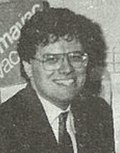List of ministers
The following ministers held the office of Minister of Works. [1]
- Key
Independent Liberal Reform United Labour National
| No. | Name | Portrait | Term of Office | Prime Minister | |||
|---|---|---|---|---|---|---|---|
| 1 | William Gisborne |  | 27 September 1870 | 2 December 1871 | Fox | ||
| 2 | John Davies Ormond |  | 2 December 1871 | 10 September 1872 | |||
| 3 | Thomas Gillies |  | 10 September 1872 | 11 October 1872 | Stafford | ||
| (2) | John Davies Ormond |  | 11 October 1872 | 29 October 1872 | Waterhouse | ||
| 4 | Edward Richardson |  | 29 October 1872 | 4 January 1877 | |||
| Fox | |||||||
| Vogel | |||||||
| Pollen | |||||||
| Vogel | |||||||
| Atkinson | |||||||
| (2) | John Davies Ormond |  | 4 January 1877 | 13 October 1877 | |||
| 5 | William Larnach |  | 13 October 1877 | 5 March 1878 | Grey | ||
| 6 | James Macandrew |  | 5 March 1878 | 8 October 1879 | |||
| 7 | Richard Oliver |  | 8 October 1879 | 31 May 1880 | Hall | ||
| 8 | Walter Johnston |  | 21 April 1882 | 23 November 1883 | Whitaker | ||
| 9 | Edwin Mitchelson |  | 23 November 1883 | 16 August 1884 | |||
| Atkinson | |||||||
| (4) | Edward Richardson |  | 16 August 1884 | 28 August 1884 | Stout | ||
| (9) | Edwin Mitchelson |  | 28 August 1884 | 3 September 1884 | Atkinson | ||
| (4) | Edward Richardson |  | 3 September 1884 | 8 October 1887 | Stout | ||
| (9) | Edwin Mitchelson |  | 11 October 1887 | 17 October 1889 | Atkinson | ||
| 10 | Thomas Fergus |  | 17 October 1889 | 24 January 1891 | |||
| 11 | Richard Seddon |  | 24 January 1891 | 2 March 1896 | Ballance | ||
| Seddon | |||||||
| 12 | William Hall-Jones |  | 2 March 1896 | 30 November 1908 | |||
| Hall-Jones | |||||||
| Ward | |||||||
| 13 | Roderick McKenzie |  | 6 January 1909 | 28 March 1912 | |||
| 14 | William MacDonald |  | 28 March 1912 | 10 July 1912 | Mackenzie | ||
| 15 | William Fraser |  | 10 July 1912 | 3 April 1920 | Massey | ||
| 16 | Gordon Coates |  | 3 April 1920 | 12 June 1926 | |||
| Bell | |||||||
| Coates | |||||||
| 17 | Kenneth Williams |  | 12 June 1926 | 10 December 1928 | |||
| 18 | Alfred Ransom |  | 10 December 1928 | 28 May 1930 | Ward | ||
| 19 | William Taverner |  | 28 May 1930 | 22 September 1931 | Forbes | ||
| (16) | Gordon Coates |  | 22 September 1931 | 10 April 1933 | |||
| 20 | John Bitchener |  | 10 April 1933 | 6 December 1935 | |||
| 21 | Bob Semple |  | 6 December 1935 | 21 January 1941 | Savage | ||
| Fraser | |||||||
| 22 | Tim Armstrong |  | 21 January 1941 | 8 November 1942 | |||
| (21) | Bob Semple |  | 8 November 1942 | 13 December 1949 | |||
| 23 | Stan Goosman |  | 13 December 1949 | 12 December 1957 | Holland | ||
| Holyoake | |||||||
| 24 | Hugh Watt |  | 12 December 1957 | 12 December 1960 | Nash | ||
| (23) | Stan Goosman |  | 12 December 1960 | 20 December 1963 | Holyoake | ||
| 25 | Percy Allen |  | 20 December 1963 | 8 December 1972 | |||
| Marshall | |||||||
| (24) | Hugh Watt |  | 8 December 1972 | 29 August 1974 | Kirk | ||
| 26 | Arthur Faulkner |  | 29 August 1974 | 10 September 1974 | |||
| (24) | Hugh Watt |  | 10 September 1974 | 13 March 1975 | Rowling | ||
| 27 | Mick Connelly |  | 13 March 1975 | 12 December 1975 | |||
| 28 | Bill Young |  | 12 December 1975 | 11 December 1981 | Muldoon | ||
| 29 | Derek Quigley |  | 11 December 1981 | 15 June 1982 | |||
| 30 | Tony Friedlander |  | 15 June 1982 | 26 July 1984 | |||
| 31 | Fraser Colman |  | 26 July 1984 | 15 August 1987 | Lange | ||
| 32 | Richard Prebble |  | 15 August 1987 | 8 November 1988 | |||
| 33 | Bill Jeffries |  | 8 November 1988 | 9 February 1990 | |||
| Palmer | |||||||
| 34 | Peter Neilson |  | 9 February 1990 | 2 November 1990 | |||
| Moore | |||||||
| 35 | Doug Kidd |  | 2 November 1990 | 3 October 1991 | Bolger | ||
| 36 | Maurice McTigue |  | 3 October 1991 | 1 July 1993 | |||
| 37 | Wyatt Creech |  | 1 July 1993 | 21 December 1993 | |||